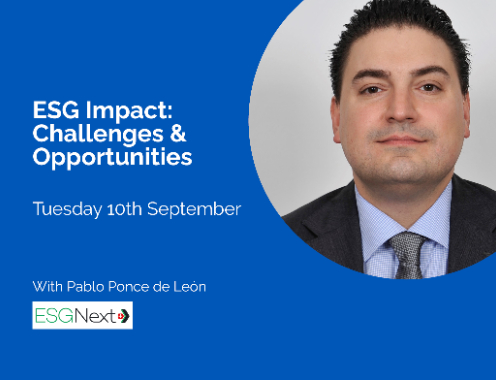ESG Impact: Challenges & Opportunities

We were delighted to host ESG Impact: Challenges and Opportunities, an interactive roundtable on Tuesday, 10th September, led by Pablo Ponce de León.
Pablo, Technical Director at ESGNext and a former CFO and Head of Internal Audit in several multinational companies, provided a thorough update on ESG’s fast-changing regulatory environment and shared actionable advice for senior Finance and Procurement & Supply Chain professionals.
The session covered disclosure frameworks, the impact on key business functions, changes in corporate roles, and the complexities surrounding ESG data.
Participants were invited to contribute to a collaborative workgroup discussion which explored the following agenda:
- Clarity of roles and responsibilities within their company
- Integration of sustainability considerations in strategy and value creation
- Preparedness for regulatory compliance and/or demands from the company's value chain
- Data availability, leverage on suppliers, perceived quality
- Customer willingness to pay for “greener” offering
Below are some of the key findings from each theme, however, if you'd like to receive a full summary, please contact Meriel Graham:
It was reiterated that the size of the organisation plays a significant role in the structure of ESG responsibilities. Larger organisations often have more defined roles with dedicated teams, while smaller companies may have individuals handling several roles, leading to "multiple hatting" and fragmented responsibility.
To drive ESG change, there’s a strong need for top-down financial incentives, especially in executive teams. Without incorporating sustainability into leadership’s performance metrics, prioritisation will lean on a “business as usual” approach potentially compromising the longer-term success of the company.
During the preparedness segment, it was found that resources are being allocated to sustainability, but ESG efforts are still largely viewed as a cost centre rather than a profit-generating activity. Companies are also struggling to see the return on investment (ROI) of these efforts.
There is potential for companies to turn sustainability initiatives into profit centres by utilising their existing infrastructure, capabilities, and assets. For instance, companies can explore circular economy models or expand product development and portfolio management efforts. These actions can help them stand out in the market, meet unmet needs of current customers, and attract new ones. Customer segmentation should be reassessed according to sustainability sensitivity.
In response to data availability, supplier audits—though commonly used—may be too costly and insufficient to uncover deep-rooted issues, particularly when suppliers are spread across diverse geographies and sectors. Companies need to develop more sophisticated ways of vetting and engaging their suppliers such as clear qualification mechanisms geared towards sustainable practices, onboarding and training initiatives.
In cases where data from suppliers is available, it is often difficult to ascertain its completeness and reliability. Therefore, pre-agreed controls and assurance mechanisms will be essential.
While exploring the final theme (customer willingness to play for a ‘greener’ offering), many companies find that developing a sustainable product has the potential to provide customer value. However, the primary drivers for such products seem to be regulatory and investor pressure, rather than direct customer demand—particularly in B2B markets.
In B2B sectors, a large portion of customers tend to expect sustainability as a given but are not willing to pay a premium for it. Companies are forced to innovate in ESG while keeping prices competitive, as sustainability is increasingly seen as a baseline requirement rather than a differentiator.
This unique development opportunity concluded with an ápero and informal networking.
Overall, the event received overwhelmingly positive feedback from the audience and we look forward to exploring this topic in further detail at future events.
If you’re a Finance professional in Switzerland, please contact Meriel Graham, or if you specialise in Procurement or Supply Chain, reach out to George Weemes to stay informed.
Disclaimer: Content shared during the event and in this article cannot be considered as legal advice. Please refer to your legal counsel.
Disclaimer: Content shared during the event and in this article cannot be considered as legal advice. Please refer to your legal counsel.






You can also use your social account to sign in. First you need to:
Accept Terms & Conditions And Privacy Policy